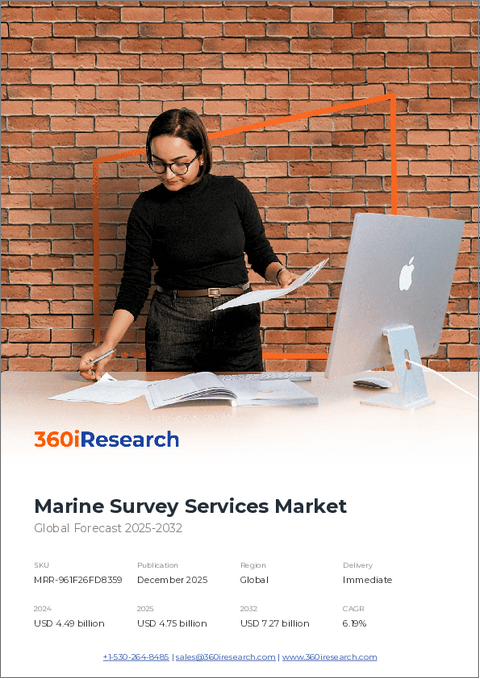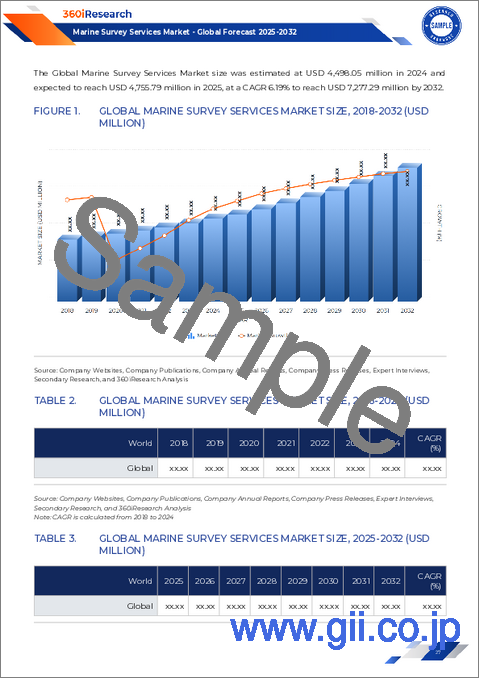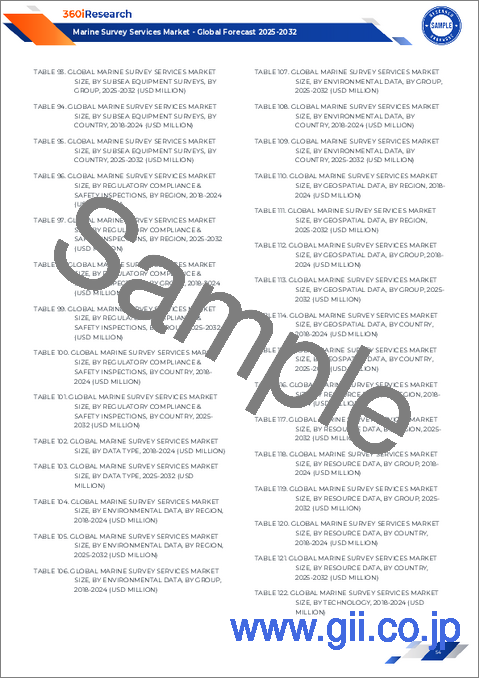|
|
市場調査レポート
商品コード
1809830
海洋調査サービス市場:タイプ別、データタイプ別、船舶タイプ別、エンドユーザー別-2025-2030年の世界予測Marine Survey Services Market by Type, Data Type, Vessel Type, End-user - Global Forecast 2025-2030 |
||||||
カスタマイズ可能
適宜更新あり
|
|||||||
| 海洋調査サービス市場:タイプ別、データタイプ別、船舶タイプ別、エンドユーザー別-2025-2030年の世界予測 |
|
出版日: 2025年08月28日
発行: 360iResearch
ページ情報: 英文 192 Pages
納期: 即日から翌営業日
|
概要
海洋調査サービス市場は、2024年には34億9,000万米ドルとなり、2025年には36億9,000万米ドル、CAGR 6.07%で成長し、2030年には49億8,000万米ドルに達すると予測されています。
| 主な市場の統計 | |
|---|---|
| 基準年2024 | 34億9,000万米ドル |
| 推定年2025 | 36億9,000万米ドル |
| 予測年2030 | 49億8,000万米ドル |
| CAGR(%) | 6.07% |
世界の海洋調査サービス業界情勢を形成する現状と新たな課題の包括的導入
世界の海洋調査業界は、技術革新と進化する規制状況の融合により、かつてない変化を経験しています。調査プロバイダーは現在、先進的なソナー、無人探査機、デジタルデータ統合を活用し、水中マッピング、構造評価、環境モニタリングにおいて比類ない精度を実現しています。さらに、持続可能性と安全性が重視されるようになったことで、事業者はより厳格な検査プロトコルを採用し、海事資産が国際基準に適合していることを確認する必要に迫られています。
重要な技術的・規制的転換が海洋調査サービス業務を変革し、精度、効率、コンプライアンス基準の向上をもたらす
過去10年間、海洋調査サービスは、リモートセンシング、自動化、データ分析の急速な進歩によって変貌を遂げてきました。高解像度のマルチビームソナーを搭載した無人探査機は、水深・海洋調査に革命をもたらし、厳しい環境下でもより迅速なデータ取得を可能にしました。さらに、クラウドベースのプラットフォームを統合することで、学際的なチーム間でのシームレスなデータ共有が容易になり、コラボレーションが強化され、プロジェクトのタイムラインが短縮されました。
米国2025年関税が海洋調査サービスのサプライチェーン、コスト構造、市場アクセス力学に与える累積的影響の評価
2025年の米国の新たな関税賦課は、海洋調査サービスプロバイダーとそのサプライチェーンに複雑な課題をもたらしました。高精度のマルチビームシステム、遠隔操作車両、特殊なセンサーを含む機器の輸入はコスト増となり、企業は調達戦略の見直しを迫られています。これを受けて、いくつかの調査事業者は国内調達の取り組みを加速させ、関税の影響を緩和し、機器の入手可能性を確保するために現地メーカーと戦略的提携を結びました。
海洋調査サービスの調査タイプ別、データタイプ別、船舶分類別、エンドユーザー需要促進要因別の細分化分析
調査タイプ別に分析すると、貨物調査、環境調査、船体・機械調査、水路調査、保険調査、オフショア調査、規制遵守・安全検査は、それぞれ明確な需要軌跡をたどっています。水路分野では、水深・海洋調査サービスが海洋インフラ開発業者や海底ケーブル敷設の通信事業者の関心を高めています。パイプライン調査、プラットフォーム設置調査、海底機器調査を含むオフショア調査サービスは、複雑なオフショア・プロジェクトのリスク軽減を求めるエネルギー分野の利害関係者にとって不可欠となっています。
南北アメリカ、欧州、中東・アフリカ、アジア太平洋の成長環境における海洋調査サービスの地域ダイナミクスを解明
大規模なオフショア・エネルギープロジェクト、港湾拡張、環境保全を重視する活発な規制環境に後押しされ、海洋調査サービスの導入では南北アメリカが引き続きリードしています。北米の事業者は、複雑な沿岸や深海のキャンペーンを管理するために、自律型調査プラットフォームや統合型SaaSへの投資を優先しています。同様に、中南米市場では、海上貿易回廊の拡大に伴い、環境ベースライン調査や貨物船の検査に対する需要が高まっています。
市場をリードする海洋調査サービスプロバイダーのプロファイル複雑な海事プロジェクトにおける革新、卓越したオペレーション、戦略的パートナーシップの推進
主要な海洋調査サービスプロバイダーは、技術と人材への戦略的投資を通じて差別化を図っています。フグロのような企業は、デジタルツインを統合して予知保全とプロジェクト計画を強化する一方で、自律型フリート能力を拡大しています。同様に、DNV GLは地理空間データ処理の専門性を強化し、クラウドネイティブプラットフォームに支えられた包括的なエンドツーエンドの分析ソリューションを顧客に提供しています。
海洋調査における新技術、規制状況、市場機会を活用するための業界リーダーへの戦略的行動提言
業界リーダーは、サービスの差別化と業務効率の向上を図るため、自律型調査プラットフォームと高度なデータ分析の統合を優先すべきです。AIを活用した処理パイプラインに支えられた無人地上車両や無人水中車両に投資することで、現場展開コストを削減し、品質を損なうことなくデータ配信を加速することができます。並行して、デジタルコラボレーションポータルを確立することで、オフショアオペレーターから規制機関まで、利害関係者が調査結果に安全かつリアルタイムでアクセスできるようになります。
1次調査と2次データ収集、定性的検証、包括的な分析フレームワークを用いた詳細な調査手法
本レポートの調査結果は、1次調査と包括的な2次分析を組み合わせた厳密な手法に基づいています。1次調査では、主要な調査プロバイダー、オフショア事業者、保険引受業者、規制機関の代表者の上級幹部との詳細な面談を実施しました。このような直接的な関与により、業務上の課題、戦略的優先事項、新たな技術導入パターンに関する定性的な洞察が得られました。
包括的な結論:海洋調査サービスにおける持続的成長のための市場力学、課題、戦略的道筋に関する中核的な知見を総合したもの
中核となる調査結果を総合すると、海洋調査サービス市場は、技術的な加速と環境・安全コンプライアンスへの関心の高まりによって定義されることが明らかになりました。利害関係者は、リソースの利用を最適化しながら高精度の結果を提供するために、自律型プラットフォーム、高度なソナーシステム、クラウドベースのアナリティクスをますます活用するようになっています。同時に、進化する規制制度は、より厳密なデータ収集と透明性の高い報告プロセスに対する需要を形成しています。
目次
第1章 序文
第2章 調査手法
第3章 エグゼクティブサマリー
第4章 市場の概要
第5章 市場力学
- リアルタイムの船舶健全性監視と予測メンテナンスのためのデジタルツイン技術の統合
- 詳細な海底地図作成と海洋構造物の検査のための自律型水中ロボットの導入
- 衛星やドローンによる画像ソリューションを使用した遠隔調査機能の需要増加
- 海底地図の精度と解像度を向上させるための高度なマルチビームソナーシステムの導入
- 厳格な海洋保全規制に準拠するための環境監視サービスの拡大
- 高解像度の水深測量を用いた専門的な洋上風力発電所検査サービスの成長
- 水路測量結果を迅速に解釈するためのAI駆動型データ分析プラットフォームの開発
- 機密性の高い海洋調査データの伝送を保護するためのサイバーセキュリティプロトコルの重要性の高まり
第6章 市場洞察
- ポーターのファイブフォース分析
- PESTEL分析
第7章 米国の関税の累積的な影響2025
第8章 海洋調査サービス市場:タイプ別
- 貨物調査
- 環境調査
- 船体および機械調査
- 水路測量
- 水深測量
- 海洋調査
- 保険調査
- オフショア調査
- パイプライン調査
- プラットフォーム設置調査
- 海底機器調査
- 規制遵守と安全検査
第9章 海洋調査サービス市場データタイプ別
- 環境データ
- 地理空間データ
- リソースデータ
第10章 海洋調査サービス市場船舶の種類別
- 貨物船
- 漁船
- 旅客船
- タンカー
第11章 海洋調査サービス市場:エンドユーザー別
- 政府機関
- インフラ開発者
- 保険会社
- オフショアオペレーター
- 運送会社
- 通信事業者およびケーブル敷設業者
第12章 南北アメリカの海洋調査サービス市場
- 米国
- カナダ
- メキシコ
- ブラジル
- アルゼンチン
第13章 欧州・中東・アフリカの海洋調査サービス市場
- 英国
- ドイツ
- フランス
- ロシア
- イタリア
- スペイン
- アラブ首長国連邦
- サウジアラビア
- 南アフリカ
- デンマーク
- オランダ
- カタール
- フィンランド
- スウェーデン
- ナイジェリア
- エジプト
- トルコ
- イスラエル
- ノルウェー
- ポーランド
- スイス
第14章 アジア太平洋地域の海洋調査サービス市場
- 中国
- インド
- 日本
- オーストラリア
- 韓国
- インドネシア
- タイ
- フィリピン
- マレーシア
- シンガポール
- ベトナム
- 台湾
第15章 競合情勢
- 市場シェア分析, 2024
- FPNVポジショニングマトリックス, 2024
- 競合分析
- ABL Group
- ABS Group of Companies, Inc.
- Royal Boskalis Westminster N.V.
- Bureau Veritas Marine & Offshore, SAS
- Coastline Surveys Ltd
- Cochran Marine Services, Inc.
- DNV AS
- E.A. Gibson Shipbrokers Ltd
- Global Maritime Group AS
- Hempel A/S
- International Marine Survey Limited
- Intertek Group plc
- Kongsberg Gruppen ASA
- Marine Surveyor Group
- Mott MacDonald Group
- Venterra Group PLC
- Polaris Marine Inc.
- Port of London Authority
- Royal Marine Group
- SEATECH MARINE SURVEYORS & CONSULTANTS PVT. LTD.
- SGS SA
- Sparrows Group
- Triton Marine Services, Inc
- TUV SUD Ltd
- Underwater Survey Technology 21






